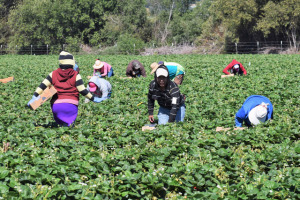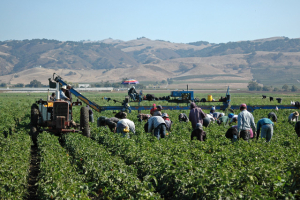ROC President Calls For A Farm Bill That Clearly Meets Public Needs, National Press Club, Washington DC
November 6, 2013 Michael R. DimockThe Farm Foundation, a nonpartisan advocate for sound agriculture policy, hosted a Farm Bill Forum at the National Press Club in Washington DC. Former Texas Congressman Charlie Stenholm moderated the panel that included Michael R. Dimock, Joe Outlaw of Texas A&M, Jon Scholl formerly of American Farmland Trust, Helen Jensen of Iowa State and Kip Tom of Tom Farms, a corn grower from Indiana. Following are Dimock’s prepared remarks.
In a controversial public statement in December of last year, USDA Secretary Tom Vilsack warned the agriculture community that they were becoming irrelevant in the eyes of the Congress. He felt that the lack of commitment to bipartisan passage of the Farm Bill revealed a change in the political dynamics that had for 80 years ensured the people’s support of farmers and ranchers across the land. This rather radical and alarming statement by the Secretary is not surprising to me. I agree with him.
I am one who is advocating for a rapid evolution in food and farming practices to ensure the health and resilience of the nation. I do this because the food system is broken. There are at least three indicators of this dysfunction. The first is the decline in the economic health of rural towns. Some of the highest unemployment rates in California are found in the farm towns that were once thriving dynamic places and that pattern is evident throughout the nation. The second is the data on soil and water degradation across the nation. Clearly, despite regulations, the way we use the land is untenable over the long haul. Nitrogen pollution is enduring and ubiquitous and over tapping of aquifers is occurring from the Midwest to the California coast. Finally, the epidemic of diet related disease confirms that although we can produce more food per farmer than ever before in history, the food that is produced at the end of the manufacturing line is often killing us. We know this is true from the media reports, the warnings from health insurance companies and the President’s 2010 Cancer panel, which felt moved to recommend eating food free from pesticides and herbicides as a path to cancer prevention. These failures in the food system have spawned a good food movement that is getting larger and more influential with each passing year.
Those who have built farming companies and food businesses based on the current dominant industrial production paradigm are worried because the hue and cry from consumers, healthcare providers, and a broad spectrum of nonprofit advocates threatens their business models. So it is a scary time and as the GMO labeling initiatives in CA and Washington or the soda war in New York City indicate the stakes are getting higher and more expensive.
So that is the context. But what is the link to the Farm Bill?
The struggle over the Farm Bill and the warning issued by Secretary Vilsack point to a path or solution for the nation’s agricultural producers and policymakers who are increasingly squeezed by demands for change. But first we must look back at history.
The first Farm Bill born in the 1930s responded to the clear needs of that time, which was shocked and rocked by the economic depression and the dust bowl. Farmers needed economic stability, the soil needed saving and an impoverished populous needed access to food. That first Farm Bill and its programs worked for a long time.
But the problems have become more complex over time. Outside of the Supplemental Nutrtion Assistance Program (SNAP), which eats up over half the Bill’s funding, the largest Farm Bill programs are commodity crop programs designed to meet the 20th Century goal of cheap abundant calories. Because the context has changed these programs are now perceived as feeding troughs that ensure success to the already successful. It appears that the bulk of our Farm Bill dollars are not rewarding innovation, but rather status quo.
With the exception of SNAP, the core concerns of the food movement are not addressed sufficiently by the Bill’s current array of programs. I am a believer in the SNAP program because it seeks to keep people from experiencing desperate hunger and it is not the center of fraud and abuse as once branded. But, the root of the hunger problem is the poverty problem, which stems from our economic failures.
The agriculture and food sector is a bright spot in the economy. It provides a positive trade balance and there are hundreds if not thousands of companies that are in the natural, local and organic food space that are creating jobs and wealth. The farm bill should be further stimulating this economic sector, characterized by differentiated products, not commodities.
The original 1930s Farm Bill ensured cheap ubiquitous calories, soil conservation and market stability. It was a social contract between the people who needed those calories and services and the farmers who provided them. Today, the nation’s people need nutritious calories. They also need economic opportunity so that they can afford healthy food. And just as importantly for preventing disease and added healthcare costs they need a clean environment. If farmers, ranchers and other producers are given compelling incentives to deliver on those goals, they will do it. And in so doing they will show their relevance, their core role in the health and resilience of the nation
Specifically, we need to replace subsidies with payments for service rendered. Those services include protecting water, soil, endangered species and providing carbon sequestration. Measurable reductions in the use of nitrogen, pesticides and herbicides should trigger payments. More investment in soil security and agricultural research that moves us from an industrial approach to an agro-ecological approach to production is essential. We need to diversify our farms and ranches, not continue down the road of monoculture. The Farm Bill can be designed to do move agriculture onto a new road.
The government can provide insurance to farmers and ranchers, they need and deserve it. But it should not be subsidized, at least not for large farms and particularly if the insurance is not tied to metrics or outcomes that point to enhanced health and resilience. This means conservation compliance must be part of any insurance scheme.
So I am here today to say that we have the emphasis on the wrong programs if we want to generate broad public support. We need a Bill that serves the entire nation now and into the future. I look forward to the dialogue to come.
Audio link from Farm Foundation website.



